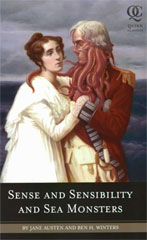

 |
 |
 |
 |
 |
 |
the anticraft > archive > NOM
Currently Taking Residence in the Freebie Box:
 Sense and Sensibility and Sea Monsters
Sense and Sensibility and Sea Monsters
by Jane Austen and Ben H. Winters
I feel I should start this by saying that I love Victorian England period romance stories. Love them. And I have always had a soft spot in my heart for anything by Jane Austen. Donít even get me started on the BBC remakes of her novels. (Colin Firth, anyone?) Wintersí adaptation of Sense and Sensibility keeps true to the plot line—the original cast of characters are all still present, Elinor and Edward marry, Marianne still ends up with Colonel Brandon. It also presents a very tongue-in-cheek view on Victorian England society and highlights how self-absorbed these characters are. Austenís pretty descriptions of the countryside and gentile life are replaced with a world where the sea has turned against the land. This is a Victorian England where two-headed Fang-Beasts spring out of the water to rip you to shreds and giant jellyfish appear on beaches to consume young women whole. The body count in this book is up there with Saving Private Ryan. What was a pastoral county cottage for the Miss Dashwoods is now a desolate shack on a lonely island and London is transformed into Sub-Marine Station Beta. All the rules of Victorian society are present, but are modified to accommodate hostile sea creatures.
Amidst all this chaos and danger, our main characters are usually too absorbed with themselves to do what any sane and rational person would do: run screaming in the other direction. When I read Austenís original Sense and Sensibility, I always grumble at how self-absorbed some of the characters are, and Winters uses their frequent ignorance of blood-thirsty sea creatures to highlight this. Your home has been destroyed by a mythical monster? Who cares! You have to make sure everyone knows who you are or are not engaged to first. Even our main heroine, Elinor, who is always cast as the most compassionate of the characters, would rather dwell on her feelings about Edward than do anything to help servants eaten by swordfish before her eyes. In this version, it is at times difficult to pity the characters of their situations when they are too self-absorbed to do the same for their fellow humans.
Winters' style of writing stays close to Austenís, but is at times a bit much and unnecessary. To read this book and find pleasure in it requires suspending quite a bit of reality and if you have read the original, that can be difficult. However, it is because Winters is so complete in his immersion of Austenís characters into a world of sea monsters that this can work, even if at times his writing is awkward. The transitions from Austenís original dialogue to Wintersí world of sea monsters are rarely seamless, but if the reader can look past that shortcoming, the story is hilarious. Sense and Sensibility and Sea Monsters is definitely a different take on Austenís original. Winters has fun with the characters, and the reader has fun as well. After reading this, I would recommend watching the 1995 movie Sense and Sensibility and trying to imagine Colonel Brandon (Alan Rickman) with a face full of squid tentacles. You will never think of him the same way again.
 Dracula: The Un-Dead
Dracula: The Un-Dead
by Dacre Stoker and Ian Holt
A fast-paced story that picks up 25 years after the destruction of Dracula, this interesting treatment of the Dracula tale provides insight and motivation for his actions before and after becoming undead. The original band of vampire slayers who survived their pursuit of Dracula which culminated in his undoing, are once again being targeted by an unspeakable evil whose goal is their deaths in the most horrific manner. As the story unfolds, the devastating toll on the lives of the group after their encounter with Dracula is laid out. With the introduction of four new major characters—Quincey Harker (headstrong son of Mina and Jonathan), Inspector Cotford (police inspector with the tenacity of an English bulldog), Monsoir Basarab (a famous Romanian stage actor), and Elizabeth Bathory (Romanian nobility with bloody habits)—and a timeline that incorporates actual happenings and people of the period, you reach a climatic ending that will leave you wanting more.
home • antifesto • this issue • archive • submit • errata • masthead • contact us • legal